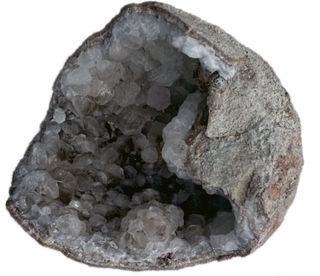Crystal-stuffed dinosaur eggs the size of cannonballs discovered in China
The giant eggs are believed to belong to a bipedal, duck-billed ornithopod.

Two cannonball-size dinosaur eggs filled with crystals have been discovered by paleontologists in China.
The fossilized, spherical eggs belong to a previously unknown dinosaur species and were found packed with calcite crystals. They were unearthed in the Qianshan Basin in East China's Anhui province.
Three eggs were dug up from the basin's soil, but only two remain; the researchers who made the discovery noted that the third was "lost and still in the process of collection." Whether the third egg was misplaced, damaged during excavation or stolen is unclear. The two remaining eggs have been classified with the name Shixingoolithus qianshanensis, making them a newly described oospecies. (Oospecies, oogenera and oofamilies are the taxonomic names for dinosaurs known only from their eggs.) The researchers published their findings Aug. 25 in the Journal of Paleontology.
Related: 10 extraordinary dinosaur discoveries from 2021
According to the researchers, the eggs are "nearly spheroid" and roughly cannonball-size, with a length of 4.1 to 5.4 inches (105 to 137 millimeters) and a width of 3.9 to 5.3 inches (99 to 134 mm). One of the two collected eggs was found partially broken; its inner surface "is covered by a calcite crystal layer, and individual calcite crystals are evident," the researchers reported.
Calcite is a carbonate mineral commonly found in the eggs of birds and dinosaurs, the study authors explained. Calcite crystals form when calcium carbonate — also used to strengthen bones, teeth and nails — separates from the eggshell structure and gets deposited on its internal surface in the form of slowly growing crystals.
A prior study published in 2014 in the journal Cretaceous Research suggested that previously discovered Shixingoolithus eggs of a different species likely belonged to an ornithopod — a group of duck-billed, herbivorous and mostly bipedal dinosaurs that grew to up to 30 feet (9 meters) long. Ornithopods lived from the latter part of the Triassic period (251.9 million to 201.3 million years ago) to the late Cretaceous period (145 million to 66 million years ago) — after which they and all the other non-avian dinosaurs were wiped out by the impact and the aftermath of the Chicxulub asteroid, which slammed into the Yucatán peninsula.
Following that cataclysmic collision, enormous amounts of sulfur were catapulted high into the stratosphere. The sulfur gases blocked out the sun and rapidly cooled Earth, possibly for centuries, while also raining lethal acid rain, changing the chemistry of the oceans for tens of thousands of years. All of this led to the extinction of roughly 75% of Earth's plant and animal species — including ornithopods.
During the Cretaceous, what is now East China experienced volcanic eruptions that deposited vast amounts of sediment, making the area an especially rich region for fossil hunters. According to National Geographic (opens in new tab), more than 60 species of plants, nearly 90 species of vertebrates, and around 300 species of invertebrates have been identified in China's northwestern Liaoning province alone.
Those conditions are also superb for preserving dinosaur eggs, the researchers reported.
"Dinosaur eggs in the Upper Cretaceous of China are characterized by prodigious quantities, abundant types and wide distribution," they wrote in the study. "Approximately 16 oofamilies and 35 oogenera have been reported in China."
Originally published on Live Science.
Live Science newsletter
Stay up to date on the latest science news by signing up for our Essentials newsletter.

Ben Turner is a U.K. based staff writer at Live Science. He covers physics and astronomy, among other topics like tech and climate change. He graduated from University College London with a degree in particle physics before training as a journalist. When he's not writing, Ben enjoys reading literature, playing the guitar and embarrassing himself with chess.
Most Popular

By Harry Baker

By Ben Turner

By Jamie Carter